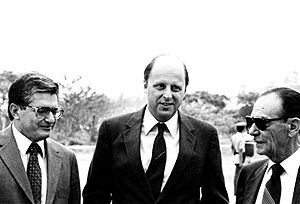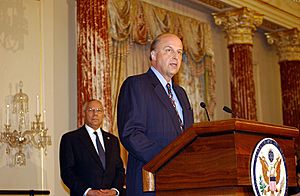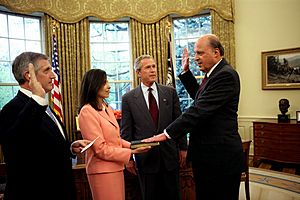John Negroponte facts for kids
Quick facts for kids
John Negroponte
|
|
|---|---|
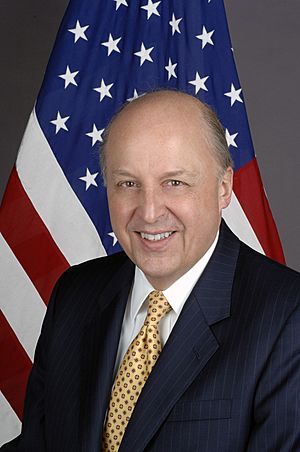
Official portrait, 2007
|
|
| 15th United States Deputy Secretary of State | |
| In office February 27, 2007 – January 23, 2009 |
|
| President | George W. Bush Barack Obama |
| Preceded by | Robert Zoellick |
| Succeeded by | James Steinberg |
| 1st Director of National Intelligence | |
| In office April 21, 2005 – February 13, 2007 |
|
| President | George W. Bush |
| Preceded by | Position established |
| Succeeded by | Mike McConnell |
| United States Ambassador to Iraq | |
| In office July 29, 2004 – March 17, 2005 |
|
| President | George W. Bush |
| Preceded by | Krzysztof Biernacki (acting) |
| Succeeded by | Zalmay Khalilzad |
| 23rd United States Ambassador to the United Nations | |
| In office September 19, 2001 – June 23, 2004 |
|
| President | George W. Bush |
| Preceded by | James B. Cunningham (acting) |
| Succeeded by | John Danforth |
| United States Ambassador to the Philippines | |
| In office October 26, 1993 – August 5, 1996 |
|
| President | Bill Clinton |
| Preceded by | Richard H. Solomon |
| Succeeded by | Thomas C. Hubbard |
| United States Ambassador to Mexico | |
| In office July 3, 1989 – September 5, 1993 |
|
| President | George H. W. Bush Bill Clinton |
| Preceded by | Charles J. Pilliod Jr. |
| Succeeded by | James R. Jones |
| 16th United States Deputy National Security Advisor | |
| In office November 23, 1987 – January 20, 1989 |
|
| President | Ronald Reagan |
| Preceded by | Colin Powell |
| Succeeded by | Robert Gates |
| Assistant Secretary of State for Oceans and International Environmental and Scientific Affairs | |
| In office July 19, 1985 – November 23, 1987 |
|
| President | Ronald Reagan |
| Preceded by | James L. Malone |
| Succeeded by | Frederick M. Bernthal |
| United States Ambassador to Honduras | |
| In office November 11, 1981 – May 30, 1985 |
|
| President | Ronald Reagan |
| Preceded by | Jack R. Binns |
| Succeeded by | John Arthur Ferch |
| Personal details | |
| Born |
John Dimitri Negroponte
July 21, 1939 London, England, UK |
| Political party | Republican |
| Spouse |
Diana Villiers
(m. 1971) |
| Children | 5 |
| Education | Yale University (BA) Harvard University |
John Dimitri Negroponte (/ˌnɛɡroʊˈpɒnti/; born July 21, 1939) is an American diplomat. He is currently a James R. Schlesinger Distinguished Professor at the Miller Center for Public Affairs at the University of Virginia. He is a former J.B. and Maurice C. Shapiro Professor of International Affairs at the George Washington University's Elliott School of International Affairs. Prior to this appointment, he served as a research fellow and lecturer in international affairs at Yale University's Jackson Institute for Global Affairs, United States Deputy Secretary of State (2007–2009), and the first ever Director of National Intelligence (2005–2007).
Negroponte served in the United States Foreign Service from 1960 to 1997. From 1981 to 1996, he had tours of duty as United States ambassador in Honduras, Mexico, and the Philippines. After leaving the Foreign Service, he subsequently served in the Bush administration as U.S. permanent representative to the United Nations from 2001 to 2004, and was ambassador to Iraq from June 2004 to April 2005.
Contents
- Early life and education
- Career
- Personal life
- Recognition
- See also
Early life and education
Negroponte was born in London, United Kingdom, on July 21, 1939, to Greek parents Dimitri John (1915–1996) and Catherine Coumantaros Negroponte (1916–2000). His father was a Greek shipping magnate and alpine skier who competed in the 1936 Winter Olympics. Negroponte attended the Allen-Stevenson School and The Buckley School and graduated from Phillips Exeter Academy in 1956 and Yale University in 1960. He was a member of Fence Club (Psi Upsilon fraternity), alongside William H. T. Bush, the brother of President George H. W. Bush, and Porter Goss, who served as Director of Central Intelligence and Director of the Central Intelligence Agency under Negroponte from 2005 to 2006.
After less than a semester at Harvard Law School, Negroponte joined the Foreign Service in 1960. He served at eight different Foreign Service posts in Asia (including the U.S. Embassy, Saigon), Europe and Latin America, and he also held important positions at the State Department and the White House. As a young Foreign Service officer—one of the few men in Washington who dared to openly disagree with Henry Kissinger's secret handling of the Vietnam peace talks—Negroponte attempted to convince his superior that any peace agreement negotiated without the consent of South Vietnam's leader Nguyen Van Thieu would be doomed to failure. Seymour Hersh claims in his book The Price of Power that Kissinger never forgave Negroponte, and, upon becoming Secretary of State, exiled him to Quito, Ecuador. Ironically, this was to be the beginning of Negroponte's long distinguished career as an ambassador. In 1981, he became the U.S. Ambassador to Honduras. From 1985 to 1987, Negroponte held the position of Assistant Secretary of State for Oceans and International Environmental and Scientific Affairs. Subsequently, he served as Deputy Assistant to the President for National Security Affairs, from 1987 to 1989; Ambassador to Mexico, from 1989 to 1993; and Ambassador to the Philippines from 1993 to 1996. As Deputy National Security Advisor to President Ronald Reagan, he was involved in the campaign to remove from power General Manuel Noriega in Panama. From 1997 until his appointment as ambassador to the U.N., Negroponte was an executive with McGraw-Hill.
Career
Ambassador to Honduras (1981–1985)
From 1981 to 1985, Negroponte was the U.S. ambassador to Honduras. During this time, military aid to Honduras grew from $4 million to $77.4 million a year, and the US began to maintain a significant military presence there, with the goal of overthrowing the revolutionary Sandinista government of Nicaragua, which had overthrown the Somoza dictatorship in a civil war.
Assistant Secretary for Environment, Oceans and Fisheries (1985–1989)
In this posting, Negroponte together with Ambassador Richard Benedick negotiated the Montreal Protocol on Ozone, the most successful modern environmental treaty, overcoming opposition from Europe, Russia, and China and from some Reagan administration officials. (R. Benedick, Ozone Diplomacy: New Directions in Safeguarding the Planet (Cambridge, Mass.: Harvard, 1998), 101) He also fostered scientific cooperation with the Soviet Union clashing with 'hard liners' like Richard Perle as well as two treaties relating to cooperation in dealing with nuclear accidents in the wake of the Chernobyl disaster.
Ambassador to Mexico (1989–1993)
During Negroponte's tour as US Ambassador to Mexico, he was instrumental in persuading the Bush administration to respond to a Mexican initiative by negotiating the North American Free Trade Agreement despite initial opposition by the U.S. Office of Trade Representative. His tenure in Mexico was thus the most consequential of any modern American ambassadorship. It was observed twenty years later that "Every so often, there comes to light a document revealing the foresight of a public servant who grasped the full consequences and implications of a particular government measure or policy. Such a document was written in the spring of 1991 by the then U.S.Ambassador to Mexico, John Negroponte." Another commentator noted the subsequent proliferation of Negroponte's vision in other free trade agreements. He officiated at the block-long, fortified embassy where he liberalized visa practices.
Ambassador to the UN (2001–2004)
President George W. Bush appointed Negroponte to be U.S. ambassador to the United Nations in February 2001, and after substantial opposition from Senate Democrats the nomination was ratified by the Senate on September 15, 2001, four days after the September 11, 2001 attacks on the United States. According to CBS News:
At the United Nations, Negroponte, 64, was instrumental in winning unanimous approval of a Security Council resolution that demanded Saddam Hussein comply with U.N. mandates to disarm.
During Colin Powell's speech to the Security Council on Iraqi weapons of mass destruction, Negroponte could be seen sitting behind Powell's left shoulder. Negroponte, however, had warned the Bush Administration about the adverse consequences of intervening in Iraq.
In the New York Review of Books, Stephen Kinzer reported that the messages sent by nominating Negroponte were that "the Bush administration will not be bound by diplomatic niceties as it conducts its foreign policy." A State Department official told him that "Giving him this job is a way of telling the UN: 'We hate you.'"
Ambassador to Iraq (2004–2005)
On April 19, 2004, Negroponte was nominated by U.S. President George W. Bush to be the United States Ambassador to Iraq after the June 30 transfer of sovereignty to the new Iraqi government. He was confirmed by the United States Senate on May 6, 2004, by a vote of 95 to 3, and was sworn in on June 23, 2004, replacing L. Paul Bremer as the U.S.'s highest ranking American civilian in Iraq. He advised the Bush administration that security had to precede reconstruction in Iraq, organized a peaceful election, and gave advice, equally unwelcome to Secretary Rumsfeld and Democrats in Congress, that a five-year commitment would be required.
Director of National Intelligence (2005–2007)
On February 17, 2005, President George W. Bush named Negroponte as the first Director of National Intelligence, (DNI), a cabinet-level position charged with coordinating the nation's Intelligence Community. On April 21, 2005, Negroponte was confirmed by a vote of 98 to 2 in the Senate, and subsequently sworn into the office that was called "substantially stronger" than its predecessor position, the Director of Central Intelligence. Part of its power stemmed from the ability to "determine" budgets, prompting President Bush to remark, "That's why John Negroponte is going to have a lot of influence. He will set the budgets." The budget of the Intelligence Community is estimated at $40 billion.
A memorandum in the Federal Register signed May 5, 2006. by President Bush states that Negroponte, as intelligence czar, be delegated the authority to exempt companies from accurate accounting standards, a power previously reserved for the chief executive under the 1934 Securities Exchange Act.
Reaction in the intelligence community to Negroponte's nomination was, according to Newsweek, "overwhelmingly positive" because he had "earned the respect of many intel professionals since those early days of the Reagan counterinsurgency." The Times noted, "if anyone can bring a semblance of unity to America's bewildering network of competing spy agencies, it is John Negroponte."
Congressional reaction was also positive. Sen. Jay Rockefeller (D-WV), then-vice chairman of the Senate Intelligence Committee said, "I think that Ambassador Negroponte is a very sound choice. Ambassador Negroponte has served bravely and with distinction in Iraq and at the United Nations during a time of turmoil and uncertainty. He brings a record of proven leadership and strong management." Rep. Jane Harman (D-CA), then-ranking member of the House Intelligence Committee noted, "John Negroponte is a smart choice for a very important job. He's a seasoned and skilled diplomat, who has served with distinction at the United Nations and in Iraq -- and he has the full confidence of the president."
According to John MacGaffin, the CIA's former associate deputy director for clandestine operations, "This is a guy who plays hardball. He's a man who understands the whole range of counterintelligence, intelligence and covert action. They're all parts of foreign policy and protecting ourselves." "We've known for the last 40 years that what's wrong [with intelligence] is that no one's in charge," one retired CIA official told Newsweek. "For once we have a chance to do something with someone truly in charge. Negroponte's going to decide what the answer is."
As DNI, Negroponte, "embarked on an impressive array of reform efforts," with "perhaps the most transformational work ... [involving] the effort to retool the creaky electronic infrastructure of the intelligence community."
According to U.S. News & World Report, one of Negroponte's first tests was on an overbudget satellite system. The $25 billion system, called the "Future Imagery Architecture," was created as the "foundation for the next generation of America's space-based surveillance efforts." The reality was quite different, as it became, "a managerial nightmare – five years behind schedule and billions over budget. Poor quality control and technical problems raised questions about whether the system would ever work properly." Negroponte "moved decisively" and jettisoned half the classified project.
Negroponte also appointed "mission managers" – intelligence professionals focused on America's hardest targets and most looming threats. The mission managers are focused on counterterrorism, counterproliferation, counterintelligence, Iran, North Korea, and Cuba and Venezuela. According to John McLaughlin, former Deputy Director of Central Intelligence (DDCI), the mission manager concept, "holds much promise for integrating analysis, collection and other intelligence activities." It has also proven beneficial during potential crises. According to a senior intelligence official quoted in U.S. News & World Report, "In the days after North Korea's recent nuclear test, the DNI put mission manager and CIA veteran Joseph DeTrani at the center of the developing crisis. Along with issuing a twice-daily intelligence summary, DeTrani served as a 'traffic cop,' coordinating analysis, briefing the White House, and tasking spies on what to target."
In a November 2006 cover story in U.S. News & World Report, it was noted that Negroponte and his office, "have made a promising start – and, remarkably, encountered an apparent willingness to embark on the necessary reforms." Progress made included the White House approval of more than 30 DNI recommendations on improving the flow of intelligence and terrorism data to state and local authorities; requiring intelligence agencies to accept each other's clearance; "open[ing] up the analytic process to new ideas and new people" to prevent groupthink – and the creation of an analytic ombudsman; the establishment of an Open Source center, "designed to broaden the flow of ideas to analysts"; and more "red teams" to challenge conventional thinking. Furthermore, the President's Daily Brief, the highly classified report given to the President each morning by Negroponte, once prepared solely by the Central Intelligence Agency, is now compiled from intelligence agencies across the government. "I believe what I can bring to the community is a sense of what our most important customer is interested in," Negroponte told US News about briefing the president.
In spite of his progress leading the Intelligence Community, though, there were rumors that Negroponte wanted to move back to the field in which he spent 37 years – the State Department and Foreign Service. The rumors became official on January 5, 2007, when Negroponte announced his resignation as DNI and move to the State Department to serve as Deputy Secretary of State.
According to Newsweek, "Under Negroponte, the intel czar's office was praised by both congressional and executive-branch officials for greatly improving—via its National Counterterrorism Center—the sharing among relevant agencies of intelligence reports about terror threats."
U.S. Deputy Secretary of State (2007–2009)
Negroponte was sworn in as U.S. Deputy Secretary of State by President George W. Bush on February 27, 2007. He served in that position until the end of the Bush administration on January 20, 2009.
Later career
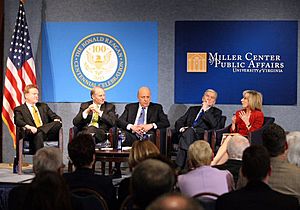
Ambassador Negroponte joined McLarty Associates, an international strategic advisory firm headquartered in Washington, D.C., in 2009. He serves on the Leadership Council of Concordia, a nonpartisan, nonprofit based in New York City focused on promoting effective public–private collaboration to create a more prosperous and sustainable future.
Negroponte was one of 50 signatories of a statement concerning 2016 Republican presidential candidate Donald Trump in which Trump was called "reckless" and stated that he would "put at risk our country's national security and well-being."
In 2020, Negroponte, along with over 130 other former Republican national security officials, signed a statement that asserted that President Trump was unfit to serve another term, and "To that end, we are firmly convinced that it is in the best interest of our nation that Vice President Joe Biden be elected as the next President of the United States, and we will vote for him."
Personal life
Negroponte speaks five languages (English, French, Greek, Spanish, and Vietnamese).
He is the elder brother of Nicholas Negroponte, founder of the Massachusetts Institute of Technology's Media Lab and of the One Laptop per Child project. His brother Michel is an Emmy Award-winning filmmaker, and his other brother, George Negroponte, is an artist and was president of the Drawing Center of New York City from 2002 to 2007.
Negroponte and his wife, Diana Mary Villiers (b. August 14, 1947), have five adopted children, Marina, Alexandra, John, George and Sophia, all of whom were adopted from Honduras.
Negroponte and his wife were married on December 14, 1971.
Recognition
- National Security Medal
- State Department Secretary's Distinguished Service Award with gold service star (in lieu of second award)
- Lifetime Achievement Award, World Affairs Councils of America
- Raymond "Jit" Trainor Award for Distinction in the Conduct of Diplomacy, Georgetown University, Institute for the Study of Diplomacy (2005)
- Golden Plate Award of the American Academy of Achievement presented by Awards Council member President Vaira Vīķe-Freiberga of Latvia (2006)
- George F. Kennan Award for Distinguished Public Service, National Committee on American Foreign Policy (2011)
- Distinguished Service Award for the Advancement of Public Discourse on Foreign Policy, American Committees on Foreign Relations (2014)
- Walter and Leonore Annenberg Award for Excellence in Diplomacy, The American Academy of Diplomacy (2019)
- Honorary Patron of the University Philosophical Society, Trinity College, Dublin.
See also
 In Spanish: John Negroponte para niños
In Spanish: John Negroponte para niños
- Negroponte doctrine
- The Ambassador (2005), Norwegian documentary film that examines the career of John Negroponte, focusing primarily on his time as U.S. Ambassador to Honduras in the early 1980s
- Iran–Contra affair
- List of U.S. political appointments that crossed party lines


